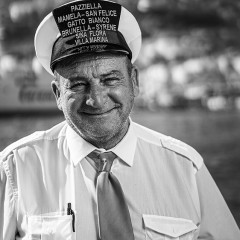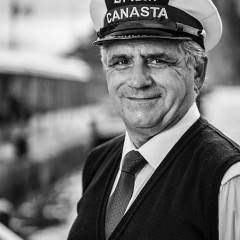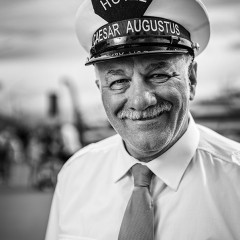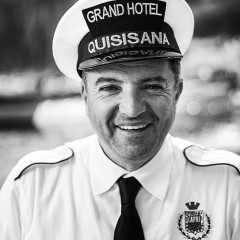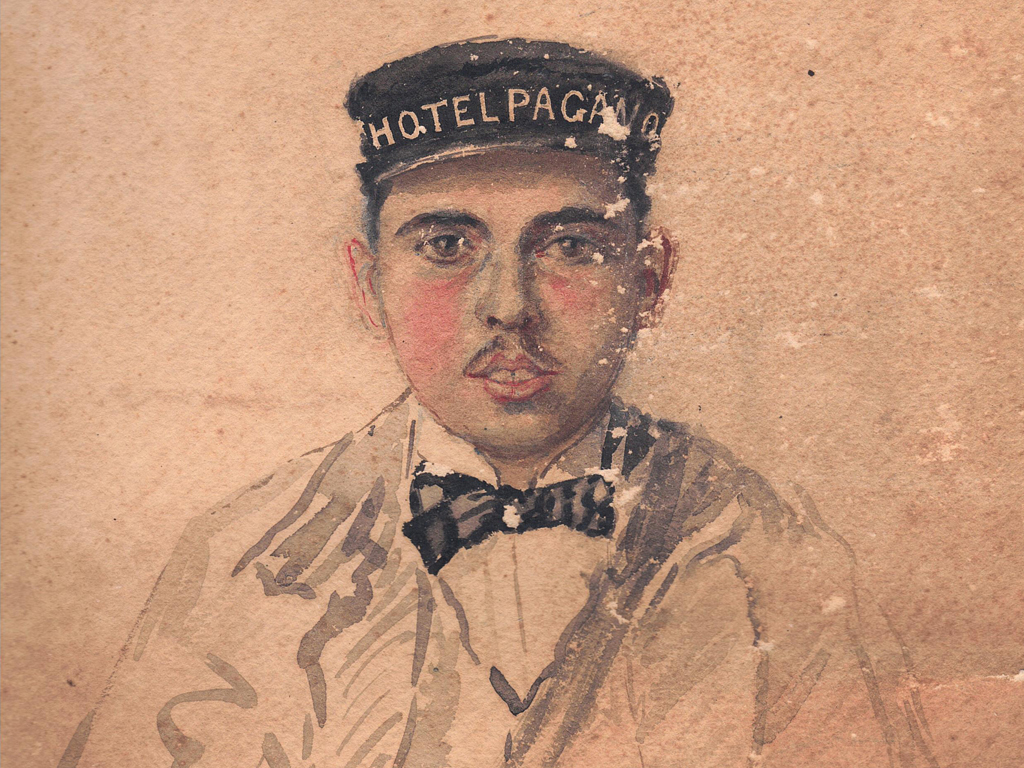
Welcome!
Agli ospiti degli hotel il benvenuto a Capri lo danno i “conduttori”, addetti all’accoglienza
con una storia antica e il sorriso sempre sulle labbra
di Antonella Maresca
foto di Umberto D’Aniello
Welcome to Capri island – Vutta a’cimm – 15.40 parte dal molo 10 – Signurì facit attenzione alla passerella – Come with me, follow the red flag – Che bella cosa na jurnata ‘e sole! N’aria serena doppo a na tempesta… – For the blue grotto in this way, please – Molla…
La prima volta che si mette piede sull’isola l’impatto può essere frastornante.
Le ridotte dimensioni del porto e il mondo che ogni giorno decide di sbarcare sulle sue coste, non restituiscono subito l’attesa immagine di pace e rifugio. Ma, dietro questa confusione, vive una precisa e puntuale organizzazione: quella dell’arte dell’ospitalità. La si può vedere nei gesti sicuri e precisi dei portabagagli, negli ormeggiatori che non mancano mai il lancio delle cime, nell’ordine e nella precisione delle divise dei conduttori che con fare caloroso e sorridente accolgono e accompagnano i “forestieri” nelle prime sensazioni isolane.
Non c’è una data precisa per la nascita di questa figura, discreta e garbata, ma si può dire che esista solo qui a Capri. Inizialmente il turismo isolano era solo invernale e di pochi ma tutto cambiò, come tante cose, dopo la riscoperta della Grotta Azzurra, nel 1826. All’epoca, l’isola brulla di contadini e pescatori non era preparata al turismo ma, poco alla volta, il disagio e la necessità resero smaliziati gli isolani, facendo in modo che, ai forestieri, non restasse che affidarsi alle persone del luogo. I marinai portavano le donne a spalla dalla barca alla riva mentre le ciucciare li conducevano, percorrendo strade sterrate, fino alle poche locande dell’epoca.
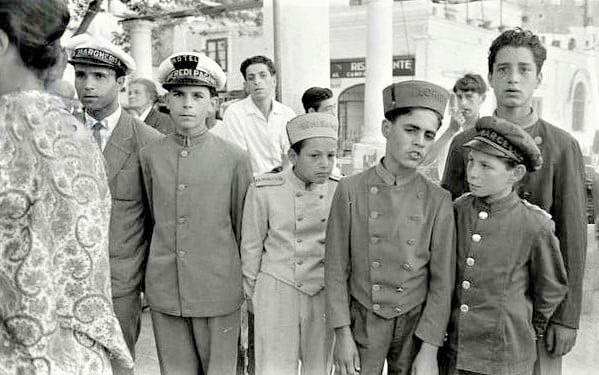 Il porto non esisteva nemmeno, i viaggi erano lunghi più di otto ore e, alle volte, ai passeggeri si chiedeva di fare testamento prima di partire ed è qui che si inserisce la figura del conduttore. Una figura pronta ad accogliere e “coccolare” l’ospite dopo una lunga traversata, farlo orientare e condurlo all’hotel.
Il porto non esisteva nemmeno, i viaggi erano lunghi più di otto ore e, alle volte, ai passeggeri si chiedeva di fare testamento prima di partire ed è qui che si inserisce la figura del conduttore. Una figura pronta ad accogliere e “coccolare” l’ospite dopo una lunga traversata, farlo orientare e condurlo all’hotel.
L’origine dell’insolito termine “conduttore” è da ricercare nelle radici latine del verbo conducere: condurre, portare insieme, riunire. Ogni hotel, piccolo o grande, ne aveva uno; fuori dalla logica moderna della prenotazione, a loro spettava accaparrarsi il cliente appena sbarcato ed è così che all’arrivo si veniva accolti da un coro di: “Manfredi Pagano! La Palma! Gaudeamus! Tiberio Palace! Quisisana!”.
Negli anni Cinquanta, quelli del boom del turismo caprese, i ragazzini delle portinerie degli hotel attendevano il turista in Piazzetta, dove arrivava una volta presa la funicolare, per accompagnarlo fino in albergo. Erano ancora i tempi in cui per segnare il nome del cliente si scriveva con i gessetti sulle valigie.
Oggi, con quasi 20mila sbarchi giornalieri, nello stesso porto che dall’inizio del secolo scorso non ha mai cambiato fattezze, i conduttori sono ancora lì perché resta viva la necessità di aiutare gli ospiti ad orientarsi in un territorio che ha una particolare conformazione fisica, come racconta Sergio Gargiulo, presidente onorario della Federalberghi e ideatore del consorzio dei conduttori. «L’idea del Consorzio Capri Turismo, fondato nel 2008, nasce da un intento pratico precedente: quello di favorire le comunicazioni tra i conduttori al porto e gli hotel. Per fare ciò, circa trent’anni fa, quando i cellulari non esistevano ancora, un gruppo di hotel si mise insieme per creare un ponte radio in modo da essere sempre in contatto».
Il suo braccio operativo è Marco Cioffi, conduttore da 35 anni, che si occupa di organizzare, gestire i turni e assumere le nuove leve e, insieme alla sua squadra, accoglie gli ospiti per vari alberghi dell’isola. «Il nostro lavoro consiste nell’accoglienza dei clienti al porto – spiega – loro sanno che c’è qualcuno che li aspetta. All’arrivo ci facciamo consegnare il bagaglio che facciamo recapitare direttamente in hotel tramite i portabagagli, gli procuriamo i biglietti della funicolare per non fargli fare la fila della biglietteria o li accompagniamo a un taxi. E alla partenza gli facciamo trovare i bagagli direttamente all’imbarco dell’aliscafo che prenderanno».
«Marco è il non plus ultra, è il nostro punto di riferimento per tutto» dice Piero Scotti, conduttore del consorzio, quest’anno al suo ultimo anno di lavoro prima della pensione. Piero conosce il porto da vari punti di vista avendo lavorato anche come portabagagli, supporto fondamentale per i conduttori. «Il porto è come un puzzle, tutto deve essere coordinato, noi siamo tutti insieme e cooperiamo perché ci vuole davvero testa per far funzionare tutto». «Ogni cliente è diverso – precisa – bisogna avere quella capacità di capire subito che tipo di persona si ha davanti; se è una persona che gradisce la chiacchiera oppure no. Nel primo caso gli spiego subito che il loro hotel, ad Anacapri, è proprio lì sopra la roccia, mentre li accompagno alle navette che dal porto conducono direttamente al Caesar Augustus».
Il porto è quel luogo dove non si può mai sapere cosa succederà, lo sa bene Gianni Scotti, uno tra gli storici conduttori isolani: «Li ho visti arrivare tutti tra gli anni Ottanta e Novanta: James Belushi, Alberto Sordi, Pippo Baudo per il Premio Faraglioni, Edwige Fenech, Mariah Carey quando registrava a Villa Lo Studio, Berlusconi e Bertinotti per Confindustria ma anche Sting, Zucchero e i Duran Duran. Così tanti che non li ricordo tutti».
Il racconto del suo lavoro è fatto di tanti piccoli dettagli tecnici come la tabella per farsi vedere nonostante la folla, la targhetta con il nome, ideata da lui, fino al modo in cui etichettare i bagagli: un codice cifrato di numeri e inziali dei clienti condiviso con la portineria. «Dopo qualche anno di pausa, quando i tre hotel per cui lavoro ora (La Minerva, La Vega e Canasta) mi hanno richiamato a lavorare al porto, mi sono emozionato. Nessun lavoro mi fa felice come quello di conduttore. Cuore, impegno e abnegazione. Ci vuole un po’ di attitudine alle pubbliche relazioni, la conoscenza delle lingue e l’arte di riuscire a leggere le persone».
Gianni Scotti si è sempre impegnato molto per formare i conduttori più giovani. Alcuni di questi lo sono ancora oggi, come Massimo Aprea che attualmente lavora per il Quisisana ma che ha iniziato la sua carriera con Marco Cioffi al consorzio e che racconta: «Il primo impatto è importantissimo. Io inquadro subito il cliente appena scende dalla passerella: abbigliamento e bagaglio sono importanti per capire chi si ha di fronte. Se è una persona che viaggia poco, molto, o se ha paura della folla. Sono la prima e l’ultima persona che la gente vede, sono il bigliettino da visita dell’hotel ma anche dell’isola stessa. Nel breve tragitto dell’accoglienza cerco di spiegare come funziona l’isola e allo stesso tempo faccio un po’ di psicologia. Sono trent’anni che ancora cerco di imparare e ricordo sempre ai ragazzi più giovani di lavorare con amore, impegno e il sorriso sempre sul viso».
Il porto è stato, è e resterà sempre quel luogo di passaggio dove si realizzano le cose più indelebili della vita: incontri, amori, addii e prime impressioni. Nonostante l’eccellente lavoro, l’augurio di Marco, Massimo, Gianni e Piero è quello di un restyling del porto, di una gestione migliore dei flussi, di avere più infrastrutture dedicate all’accoglienza degli ospiti che siano il biglietto da visita che la bellezza dell’isola merita.
Per avere il tempo di offrire, tra uno sbarco e l’altro, un servizio eccellente, che faccia percepire la cura, la stessa o anche più, che portò il medico scozzese Smith Clark, a trasformare la casa di cura Quisisana in hotel. Perché, oggi come allora, Capri è cura e, quasi sempre, Capri è la cura.
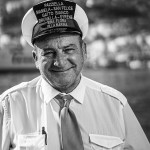 Marco Cioffi, coordinatore del Consorzio Capri Turismo dalla fondazione. Inizia come portiere poi, una fortuita sostituzione, gli fa scoprire la bellezza del lavoro al porto, dove le giornate scivolano via veloci e bisogna sempre essere pronti a tutto ciò che può capitare. Sono 35 anni che fa il conduttore, occupandosi di organizzare gli altri e selezionare le nuove leve. | Marco Cioffi, coordinator of the Consorzio Capri Turismo since its foundation. He started as a hotel porter and then, while taking someone’s place by chance one day, he discovered the joy of working at the harbour, where the days pass quickly and you always need to be ready for anything that might happen. He has been a conduttore now for 35 years, with responsibility for organizing the others and choosing the new generations of conduttori.
Marco Cioffi, coordinatore del Consorzio Capri Turismo dalla fondazione. Inizia come portiere poi, una fortuita sostituzione, gli fa scoprire la bellezza del lavoro al porto, dove le giornate scivolano via veloci e bisogna sempre essere pronti a tutto ciò che può capitare. Sono 35 anni che fa il conduttore, occupandosi di organizzare gli altri e selezionare le nuove leve. | Marco Cioffi, coordinator of the Consorzio Capri Turismo since its foundation. He started as a hotel porter and then, while taking someone’s place by chance one day, he discovered the joy of working at the harbour, where the days pass quickly and you always need to be ready for anything that might happen. He has been a conduttore now for 35 years, with responsibility for organizing the others and choosing the new generations of conduttori.
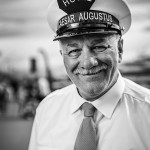 Piero Scotti inizia la sua carriera al Caesar Augustus dove quest’anno svolgerà il suo ultimo anno di servizio. Porta con sé l’esperienza dell’ospitalità caprese vissuta a 360 gradi alternandosi tra servizio ai piani, portabagagli, cameriere ma, per più anni, portiere e conduttore, ruolo in cui affianca i giovanissimi per insegnargli il mestiere. | Piero Scotti started his career at the Caesar Augustus hotel, where he will complete his last year of service this year. He carries with him an all-round experience of Capri hospitality, having alternated between jobs in housekeeping, as a luggage porter and as a room attendant, but he spent the longest periods as a hotel porter and conduttore, the role in which he mentors the younger members of staff, teaching them the trade.
Piero Scotti inizia la sua carriera al Caesar Augustus dove quest’anno svolgerà il suo ultimo anno di servizio. Porta con sé l’esperienza dell’ospitalità caprese vissuta a 360 gradi alternandosi tra servizio ai piani, portabagagli, cameriere ma, per più anni, portiere e conduttore, ruolo in cui affianca i giovanissimi per insegnargli il mestiere. | Piero Scotti started his career at the Caesar Augustus hotel, where he will complete his last year of service this year. He carries with him an all-round experience of Capri hospitality, having alternated between jobs in housekeeping, as a luggage porter and as a room attendant, but he spent the longest periods as a hotel porter and conduttore, the role in which he mentors the younger members of staff, teaching them the trade.
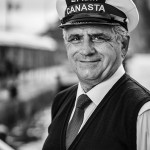 Giovanni Scotti inizia la sua attività lavorativa nel 1973, dopo un percorso di scuola alberghiera e varie tappe europee per imparare le lingue. Il suo punto forte sono le pubbliche relazioni che affina affiancando grandi maestri dell’ospitalità caprese come portiere turnante (portiere di giorno, di notte e conduttore) principalmente presso l’hotel Quisisana che porta sempre nel cuore. Oggi è conduttore per tre hotel: La Minerva, Canasta e La Vega. | Giovanni Scotti began his working life in 1973, after attending hotel training school and spending various periods in Europe to learn languages. His strong point is public relations, which he has fine-tuned by working alongside some of the great masters of Capri hospitality, such as the ‘portiere turnante’ (the hotel day and night porter and conduttore), mainly at the hotel Quisisana, which has always had a special place in his heart. Today he is the conduttore for three hotels: La Minerva, Canasta and La Vega.
Giovanni Scotti inizia la sua attività lavorativa nel 1973, dopo un percorso di scuola alberghiera e varie tappe europee per imparare le lingue. Il suo punto forte sono le pubbliche relazioni che affina affiancando grandi maestri dell’ospitalità caprese come portiere turnante (portiere di giorno, di notte e conduttore) principalmente presso l’hotel Quisisana che porta sempre nel cuore. Oggi è conduttore per tre hotel: La Minerva, Canasta e La Vega. | Giovanni Scotti began his working life in 1973, after attending hotel training school and spending various periods in Europe to learn languages. His strong point is public relations, which he has fine-tuned by working alongside some of the great masters of Capri hospitality, such as the ‘portiere turnante’ (the hotel day and night porter and conduttore), mainly at the hotel Quisisana, which has always had a special place in his heart. Today he is the conduttore for three hotels: La Minerva, Canasta and La Vega.
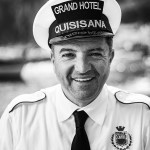 Massimo Aprea festeggia quest’anno i 30 anni di carriera. Dopo la scuola alberghiera e i primi passi nel mondo del lavoro, a 22 anni inizia a fare il conduttore e non ha più smesso. Interprete del teatro caprese, usa le sue doti attoriali per accogliere al meglio il cliente che si troverà di fronte. Ai giovani conduttori insegna sempre che ci vuole impegno e amore per fare questo mestiere. | Massimo Aprea is celebrating 30 years in the job this year. After hotel training school and his first experiences in the world of work, he began working as a conduttore at the age of 22 and hasn’t stopped since. As a Capri theatre performer, he uses his gifts as an actor to greet each customer he meets in the best way. He always reminds the young conduttori that it takes commitment and love to do this job.
Massimo Aprea festeggia quest’anno i 30 anni di carriera. Dopo la scuola alberghiera e i primi passi nel mondo del lavoro, a 22 anni inizia a fare il conduttore e non ha più smesso. Interprete del teatro caprese, usa le sue doti attoriali per accogliere al meglio il cliente che si troverà di fronte. Ai giovani conduttori insegna sempre che ci vuole impegno e amore per fare questo mestiere. | Massimo Aprea is celebrating 30 years in the job this year. After hotel training school and his first experiences in the world of work, he began working as a conduttore at the age of 22 and hasn’t stopped since. As a Capri theatre performer, he uses his gifts as an actor to greet each customer he meets in the best way. He always reminds the young conduttori that it takes commitment and love to do this job.
Hotel guests are welcomed to Capri by the “conduttori”, official “greeters” with a long history behind them and always a smile on their lips
The first time people set foot on the island the impact can be bewildering. The small size of the harbour, and the world that decides to land on the island’s shores every day do not immediately fit the expected image of peace and repose. But behind all this confusion there is a meticulous and careful organization: that of the art of hospitality. You can see it in the safe, careful hands of the porters, in the seamen who manage the docking of the boats, never missing their target when they throw the ropes, and in the neat, smart uniforms of the conduttori who greet and accompany the “forestieri”, or foreign visitors, with warm smiles during their first experiences on Capri. There is no exact date indicating when this discreet, pleasant-mannered figure came into existence, but it’s fair to say that it can only be found on Capri. At first, tourists only came to the island during the winter and there were very few of them, but, as with many things, everything changed after the rediscovery of the Grotta Azzurra in 1826. Back then, Capri was a barren island of peasant farmers and fishermen that was not at all well-prepared for tourism, but bit by bit, privation and need made the islanders more worldly wise and eventually guests could just entrust themselves to the hands of the local inhabitants. The sailors would carry the women on their shoulders from the boat to the shore, while donkeys would carry them along the unsurfaced roads to the doors of the few hotels that existed at that time. The harbour didn’t even exist back then: the boat trip was over eight hours long and sometimes the passengers were asked to make their wills before embarking; and this was where the figure of the conduttore came in: someone who would look after and “pamper” guests after the long crossing, who would orientate them and take them to their hotels. The origin of this unusual term, “conduttore”, can be traced to its Latin roots in the verb conducere: to lead, to bring or gather together. Every hotel, whether big or small, used to have one; in contrast to the modern system of booking in advance, it was the task of the conduttori to corner the customer as soon as they had disembarked, and hence visitors would be greeted on their arrival by a chorus of: 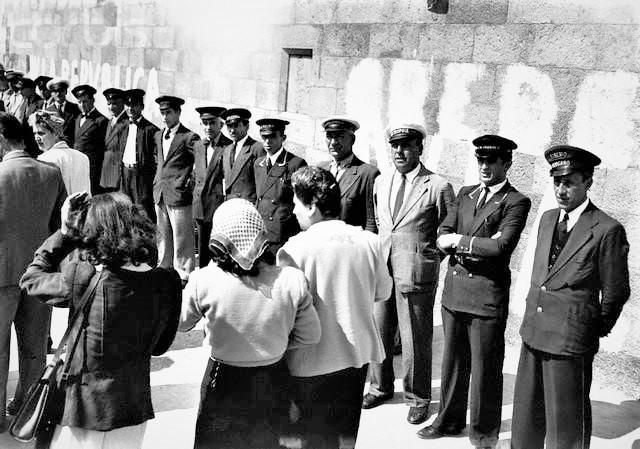 “Manfredi Pagano! La Palma! Gaudeamus! Tiberio Palace! Quisisana!” During the boom years for Capri tourism in the 1950s, young hotel concierge staff would wait for the tourists in the Piazzetta, where they would arrive after taking the funicular, ready to accompany them to their hotel. In those days they still wrote the names of the customers on the suitcases with chalk. Nowadays, with almost 20,000 people landing on Capri every day, in the same harbour that has not changed its appearance since the beginning of the last century, the conduttori still exist because there remains an obvious need to help guests orientate themselves in a territory with an unusual physical layout. Sergio Gargiulo, the honorary president of Federalberghi (the Italian hospitality association), who came up with the idea for a consortium of conduttori, explains: “The idea of the Consorzio Capri Turismo, founded in 2008, sprang from a previous practical aim: to facilitate communications between the conduttori at the harbour and the hotels. This was about thirty years ago, when mobile phones didn’t yet exist, so in order to achieve this objective, a group of hotels got together to create a radio link so they could always keep in contact.” Marco Cioffi, who has been a conduttore for 35 years, is the operational arm of the consortium: he takes care of the organisation, managing shifts and recruiting new staff and, together with his team, he greets guests staying at various hotels on the island. “Our job is to greet customers at the harbour,” he explains. “They know that someone will be waiting for them there. On their arrival, we collect their luggage and arrange to have it delivered directly to the hotel by the porters, and we get them tickets for the funicular so that they don’t have to queue at the ticket office, or we accompany them to a taxi. And when they leave, we arrange for them to have their luggage delivered directly to to the embarkation point for the hydrofoil that they are taking.” “Marco is the ultimate man to go to, our point of reference for everything,” says Piero Scotti, a conduttore in the consortium, now in his last year of work before he retires. Piero knows the harbour well from different points of view, having also worked as a porter, an essential support for the conduttori. “The harbour is a kind of puzzle: everything has to be coordinated, and we all work together and cooperate with each other because it takes a lot of careful planning for everything to work.” “Every client is different,” he points out. “You need to have the ability to understand immediately what type of person you are dealing with, whether it is someone who likes to chat or not. If it is, I immediately explain that their hotel in Anacapri is just there, at the top of the rock, while I accompany them to the shuttle buses that will take them from the harbour directly to the Hotel Caesar Augustus.” The harbour is a place where you never know what will happen, as Gianni Scotti knows very well. He is one of the historic island conduttori: “I saw everyone arrive here during the 1980s and 1990s: James Belushi, Alberto Sordi, Pippo Baudo for the Premio Faraglioni, Edwige Fenech, Mariah Carey when she was recording at Villa Lo Studio, Berlusconi and Bertinotti for Confindustria, and also Sting, Zucchero and Duran Duran. There are so many I can’t remember them all.” The story of his work is made up of lots of small technical details such as the board he displays so that people can see him despite the crowds, the nameplate, which Scotti thought up himself, and even the way of labelling the luggage: a code made up of numbers and the customers’ initials, shared with the hotel reception. “I had had a few years’ break, but then, when the three hotels that I now work for (La Minerva, La Vega and Canasta) called me back to work at the harbour, I was thrilled. No job makes me so happy as being a conduttore. Heart, commitment and self-sacrifice. You need some aptitude for public relations, a knowledge of languages and the ability to to ‘read’ people.” Gianni Scotti has always worked very hard to train the younger conduttori. Some of these still work as conduttori today, such as Massimo Aprea who now works for the Quisisana but who began his career with Marco Cioffi at the consortium. He tells us: “The first impression is very important. I always identify the customer as soon as he or she walks down the walkway: clothes and luggage are important to understand who you are dealing with. It may be someone who travels very little, or a lot, or they may be afraid of crowds. I am the first and last person that people see; I’m the calling card for the hotel, and for the island itself. During that first short welcome trip, I try to explain how the island works and at the same time I practise a bit of psychology. I’ve been trying to learn for thirty years now, and I always remind the young conduttori to work with love, commitment and always with a smile on their faces.” The harbour has always been and will always be a place of passage, where the most significant aspects of life take place: encounters, love affairs, farewells and first impressions. Despite their excellent work, Marco, Massimo, Gianni and Piero are all hoping for a restyling of the harbour, with better management of the flows of people, and more infrastructure dedicated to welcoming the guests, in order to provide the showcase that the beauty of the island deserves. And so that they have the time to offer an excellent service, between one disembarkation and another, that makes people feel the care, that same care, or even greater, that led the Scottish doctor Smith Clark to turn the Quisisana sanatorium into a hotel. Because Capri is today, as it was then, the treatment and, almost always, Capri is the cure.
“Manfredi Pagano! La Palma! Gaudeamus! Tiberio Palace! Quisisana!” During the boom years for Capri tourism in the 1950s, young hotel concierge staff would wait for the tourists in the Piazzetta, where they would arrive after taking the funicular, ready to accompany them to their hotel. In those days they still wrote the names of the customers on the suitcases with chalk. Nowadays, with almost 20,000 people landing on Capri every day, in the same harbour that has not changed its appearance since the beginning of the last century, the conduttori still exist because there remains an obvious need to help guests orientate themselves in a territory with an unusual physical layout. Sergio Gargiulo, the honorary president of Federalberghi (the Italian hospitality association), who came up with the idea for a consortium of conduttori, explains: “The idea of the Consorzio Capri Turismo, founded in 2008, sprang from a previous practical aim: to facilitate communications between the conduttori at the harbour and the hotels. This was about thirty years ago, when mobile phones didn’t yet exist, so in order to achieve this objective, a group of hotels got together to create a radio link so they could always keep in contact.” Marco Cioffi, who has been a conduttore for 35 years, is the operational arm of the consortium: he takes care of the organisation, managing shifts and recruiting new staff and, together with his team, he greets guests staying at various hotels on the island. “Our job is to greet customers at the harbour,” he explains. “They know that someone will be waiting for them there. On their arrival, we collect their luggage and arrange to have it delivered directly to the hotel by the porters, and we get them tickets for the funicular so that they don’t have to queue at the ticket office, or we accompany them to a taxi. And when they leave, we arrange for them to have their luggage delivered directly to to the embarkation point for the hydrofoil that they are taking.” “Marco is the ultimate man to go to, our point of reference for everything,” says Piero Scotti, a conduttore in the consortium, now in his last year of work before he retires. Piero knows the harbour well from different points of view, having also worked as a porter, an essential support for the conduttori. “The harbour is a kind of puzzle: everything has to be coordinated, and we all work together and cooperate with each other because it takes a lot of careful planning for everything to work.” “Every client is different,” he points out. “You need to have the ability to understand immediately what type of person you are dealing with, whether it is someone who likes to chat or not. If it is, I immediately explain that their hotel in Anacapri is just there, at the top of the rock, while I accompany them to the shuttle buses that will take them from the harbour directly to the Hotel Caesar Augustus.” The harbour is a place where you never know what will happen, as Gianni Scotti knows very well. He is one of the historic island conduttori: “I saw everyone arrive here during the 1980s and 1990s: James Belushi, Alberto Sordi, Pippo Baudo for the Premio Faraglioni, Edwige Fenech, Mariah Carey when she was recording at Villa Lo Studio, Berlusconi and Bertinotti for Confindustria, and also Sting, Zucchero and Duran Duran. There are so many I can’t remember them all.” The story of his work is made up of lots of small technical details such as the board he displays so that people can see him despite the crowds, the nameplate, which Scotti thought up himself, and even the way of labelling the luggage: a code made up of numbers and the customers’ initials, shared with the hotel reception. “I had had a few years’ break, but then, when the three hotels that I now work for (La Minerva, La Vega and Canasta) called me back to work at the harbour, I was thrilled. No job makes me so happy as being a conduttore. Heart, commitment and self-sacrifice. You need some aptitude for public relations, a knowledge of languages and the ability to to ‘read’ people.” Gianni Scotti has always worked very hard to train the younger conduttori. Some of these still work as conduttori today, such as Massimo Aprea who now works for the Quisisana but who began his career with Marco Cioffi at the consortium. He tells us: “The first impression is very important. I always identify the customer as soon as he or she walks down the walkway: clothes and luggage are important to understand who you are dealing with. It may be someone who travels very little, or a lot, or they may be afraid of crowds. I am the first and last person that people see; I’m the calling card for the hotel, and for the island itself. During that first short welcome trip, I try to explain how the island works and at the same time I practise a bit of psychology. I’ve been trying to learn for thirty years now, and I always remind the young conduttori to work with love, commitment and always with a smile on their faces.” The harbour has always been and will always be a place of passage, where the most significant aspects of life take place: encounters, love affairs, farewells and first impressions. Despite their excellent work, Marco, Massimo, Gianni and Piero are all hoping for a restyling of the harbour, with better management of the flows of people, and more infrastructure dedicated to welcoming the guests, in order to provide the showcase that the beauty of the island deserves. And so that they have the time to offer an excellent service, between one disembarkation and another, that makes people feel the care, that same care, or even greater, that led the Scottish doctor Smith Clark to turn the Quisisana sanatorium into a hotel. Because Capri is today, as it was then, the treatment and, almost always, Capri is the cure.






